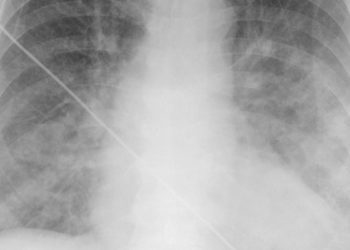β-blockers linked to improved survival in preserved ejection fraction heart failure
1. β-blockers were associated with lower all-cause mortality in patients with heart failure with preserved ejection fraction (HFPEF).
2. There was no association observed between β-blockers use in patients with HFPEF and outcome when the outcome was expanded to include either all-cause mortality or hospitalization for heart failure.
Evidence Rating Level: 2 (Good)
Study Rundown: The benefit of β-blocker therapy in diastolic heart failure or heart failure with preserved ejection fraction (HFPEF) has not been fully elucidated. β-blockers, however, have an established role in decreasing mortality in systolic heart failure (or heart failure with reduced ejection fraction, HFREF) and may offer the same advantages to patients with HFPEF. β-blockers block the action of catecholamines (i.e., epinephrine and norepinephrine) on beta-adrenergic receptors and decrease blood pressure and subsequent remodeling of the heart, resulting in improvement in signs and symptoms of heart failure.
This study aimed to examine the mortality benefits of β-blocker therapy in patients with HFPEF. Patients with ejection fractions from 40% to 49% and 50% or higher were included in the study. A HFPEF cohort was created and propensity score matching was performed and matched each untreated patient to 2 treated patients. It was found that all-cause mortality was reduced but a combination of all-cause mortality or heart failure hospitalizations was not. A positive-control analysis was performed in HFREF patients as well. Limitations of this study include selection bias, confounding despite propensity matching, and the inability to assess cause-specific mortality. This study suggests that similar to HFREF, patients with HFPEF may also benefit from β-blocker therapy. However, randomized controlled trials are needed to confirm and further assess the extent and nature of this benefit.
Click to read the study, published today in JAMA
Click to read an accompanying editorial, published today in JAMA
Relevant Reading: Effects of Beta-Blockers on Heart Failure with Preserved Ejection Fraction: A Meta-Analysis
In-Depth [propsective cohort trial]: This study examined 19,083 patients with HFPEF from the Swedish Heart Failure Registry and propensity matched to obtain a 2:1 ratio of 5,496 treated and 2,748 untreated patients. In the overall HFPEF group, the β-blocker group had 143 deaths per 100 patient-years vs. 198 deaths in the non β-blocker group (p<0.001). The unadjusted HR throughout follow-up was 0.73 (95%CI 0.69-0.77). In the matched HFPEF cohort, there were 2,279 total deaths in the treated group and 1,244 total deaths in the untreated group. The β-blocker group had 177 deaths per 1000 patient-years vs. 191 deaths per 1000 patient-years in the non β-blocker group (p=0.03). The HR throughout follow-up was 0.93 (95%CI 0.86-0.996). β-blockers were not associated with decreased combined all-cause mortality or heart failure hospitalizations. In the positive-control consistency analysis with the HFREF cohort, β-blockers were linked with reduced mortality, reduced combined mortality or heart failure hospitalization.
More from this author: Prophylactic implantable cardioverter-defibrillators may decrease mortality in left ventricular dysfunction, The VIDA trial: Vitamin D3 does not improve outcomes in asthma patients, No survival benefit with everolimus treatment for hepatocellular carcinoma [EVOLVE-1 Trial], Hydrolyzed formula in susceptible infants does not reduce Diabetes-linked autoantibodies
Image: PD
©2014 2 Minute Medicine, Inc. All rights reserved. No works may be reproduced without expressed written consent from 2 Minute Medicine, Inc. No article should be construed as medical advice and is not intended as such by the authors, editors, staff or by 2 Minute Medicine, Inc.







![Mechanical CPR provides no benefit over manual CPR [PARAMEDIC trial]](https://www.2minutemedicine.com/wp-content/uploads/2014/11/Asystole11-75x75.jpg)